You are here
New Releases
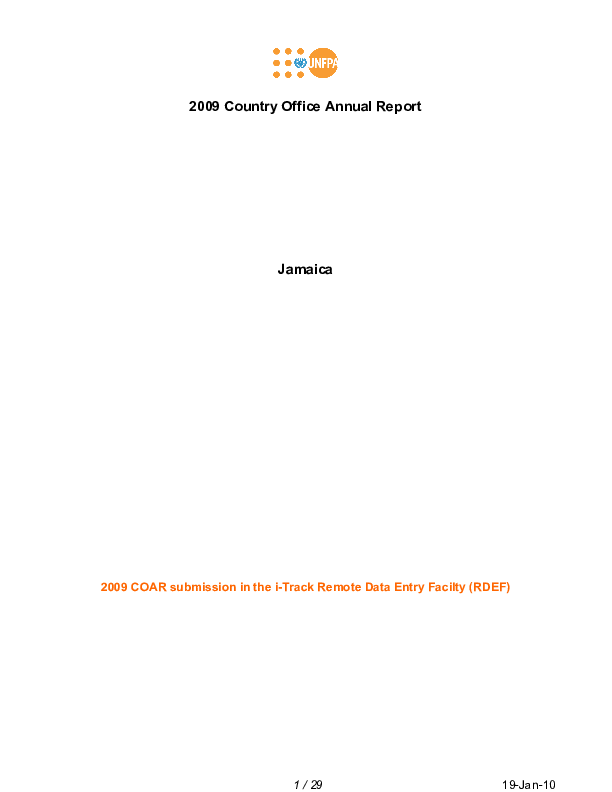
2009 Country Office Annual Report
2009 COAR submission in the i-Track Remote Data Entry Facilty (RDEF)
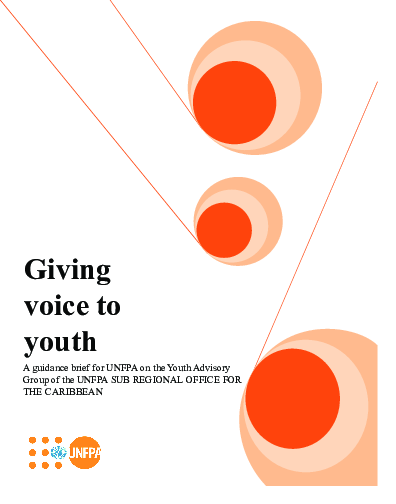
Giving Voice to Youth
The YAG is a broad based and expansive regional group of young people, in particular those who are vulnerable and live in extremely difficult circumstances. The group provides a youth consultative forum on UNFPA policies and programmes in the English and Dutch Speaking Caribbean region. It is made up of National Youth Advisory Groups where possible and a Regional Advisory Group of selected young people from the different countries served byUNFPA.
The purpose of the Youth Advisory Group is: To facilitate open dialogue and exchange among youth and between UNFPA Management and Staff and youth where UNFPA is advised on the diverse range ofyouth issues and strategic opportunities and actions to address them.
Specifically, the objectives of the Youth Advisory Group are to:
- Bring a youth perspective on issues affecting Caribbean youth so as to ensure that their rights and needs are acknowledged and promoted within the UNFPA programme for the English and Dutch Speaking Caribbean(EDSC) and the overall work of the UNFPA Sub-Regional Office;
- Facilitate knowledge-sharing about best practices and lessons learned for moving the agenda of young people’s rights, gender equality and sexual and reproductive health forward;
- Develop and promote youth-adult partnerships within UNFPA to enhance programme delivery at the national and regional levels and to empower young women and men;
- Improve young people’s understanding of the principles and Plan of Action of the ICPD, UNFPA’s mandate and the organisations’ efforts to improve the lives of young people;
- Strengthen the skills of young people (especially vulnerable and disadvantaged young people) in areas that include leadership, decision-making, communication, problem-solving and advocacy, thereby facilitating their effective participation in National Developmental processes.
The expected results from the Youth Advisory Group are :
- Overall improvement in the youth-friendliness and responsiveness of the Programme of Cooperation for the English and Dutch Speaking Caribbean (EDSC) and the UNFPA Sub-Regional Office’s policies and programmes to address young people’s rights and needs; and
- Improved capacity and confidence of young people, especially the most vulnerable, to participate in National Development processes.
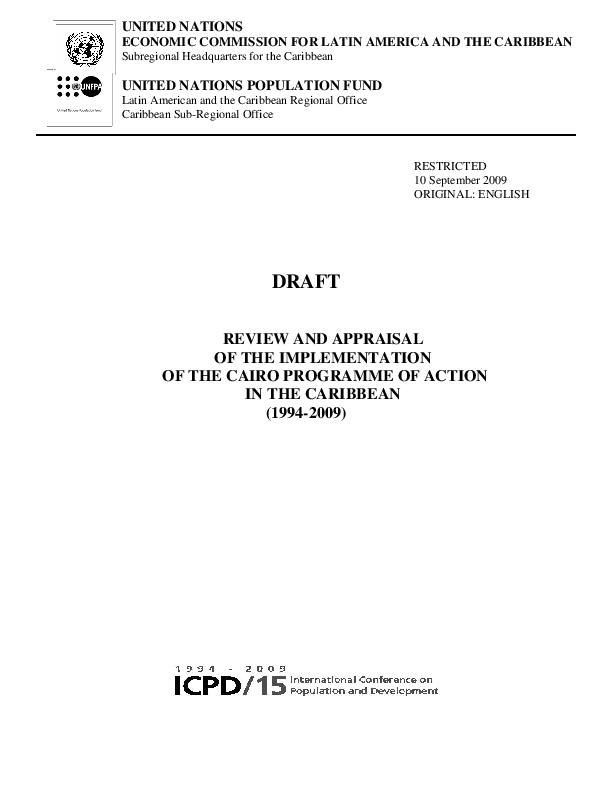
International Conference on Population and Development (ICPD) at 15
At the International Conference on Population on Development (ICPD) held in 1994 in Cairo, Egypt, industrialized and developing countries alike forged an inspiring and farsighted plan that integrated a wide range of population, development and human rights issues into a blueprint for 20 years of action. Concrete goals of the ICPD centered on providing universal education; reducing infant, child and maternal mortality; and ensuring universal access by 2015 to reproductive health care, including family planning, assisted childbirth and prevention of sexually transmitted infections including HIV and AIDS. This year (2009) marks the 15th anniversery of the ICPD and reminds us of the five years remaining to fulfil the commitments made in Cairo.
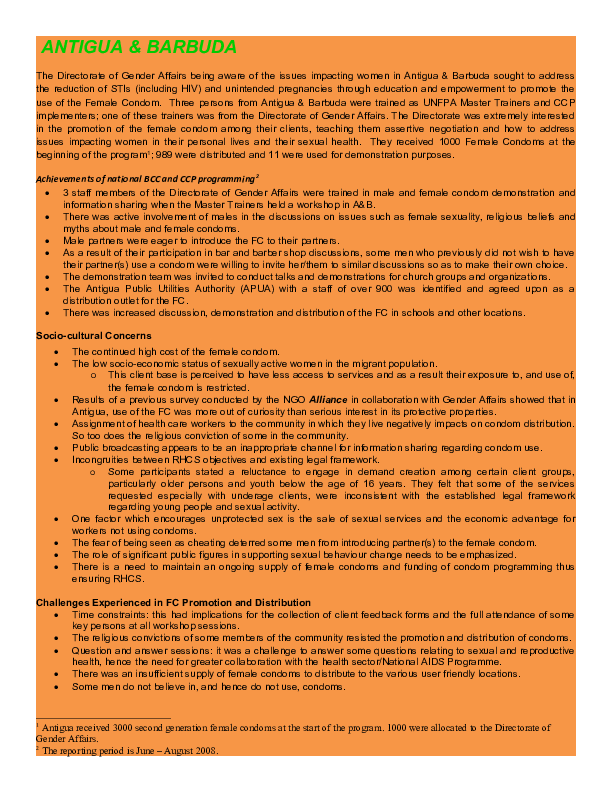
Case Study on Female Condom Promotion in Antigua
The Directorate of Gender Affairs being aware of the issues impacting women in Antigua & Barbuda sought to address the reduction of STIs (including HIV) and unintended pregnancies through education and empowerment to promote the use of the Female Condom. Three persons from Antigua & Barbuda were trained as UNFPA Master Trainers and CCP implementers; one of these trainers was from the Directorate of Gender Affairs. The Directorate was extremely interested in the promotion of the female condom among their clients, teaching them assertive negotiation and how to address issues impacting women in their personal lives and their sexual health. They received 1000 Female Condoms at the beginning of the program [1] ; 989 were distributed and 11 were used for demonstration purposes.
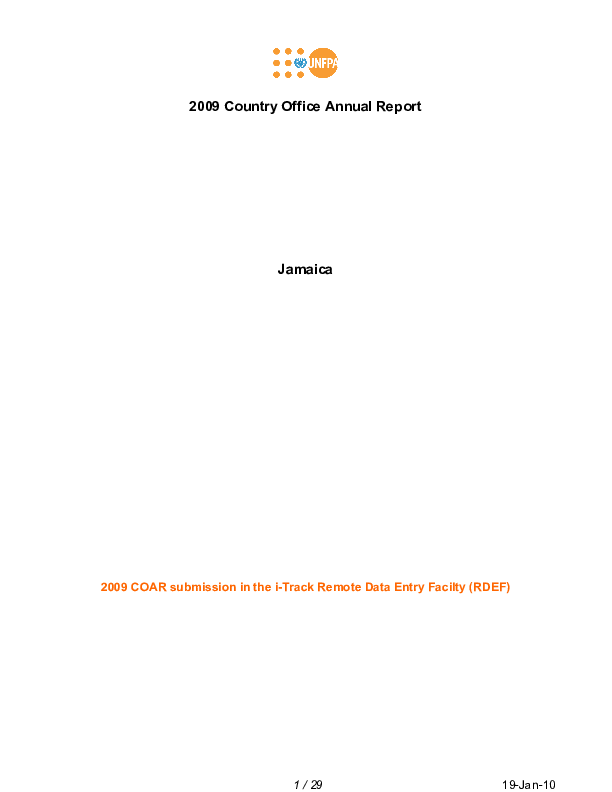
2009 Country Office Annual Report
While the year 2009 proved to be particularly challenging for Jamaica in light of an increasing debt burden, increasing unemployment and the outbreak of the AH1N1 virus, several achievements were realized with UNFPA's support. These are outlined according to the three main areas of work, sexual and reproductive health, population and development and gender.
Sexual and Reproductive Health *Increased number of traditional and non-traditional organizations and sites promoting access to reproductive health information and services.
Over ten new organizations were involved in the Comprehensive Condom programme which focused on promoting increased knowledge of sexual and reproductive health including HIV prevention, behaviour change communication and access to male and female condoms. Among the partners in this initiative were the Bureau of Women's Affairs, Jamaica Council for Persons with Disabilities and the University of the West Indies Health Centre *Increase in the number of vulnerable groups accessing reproductive health services.
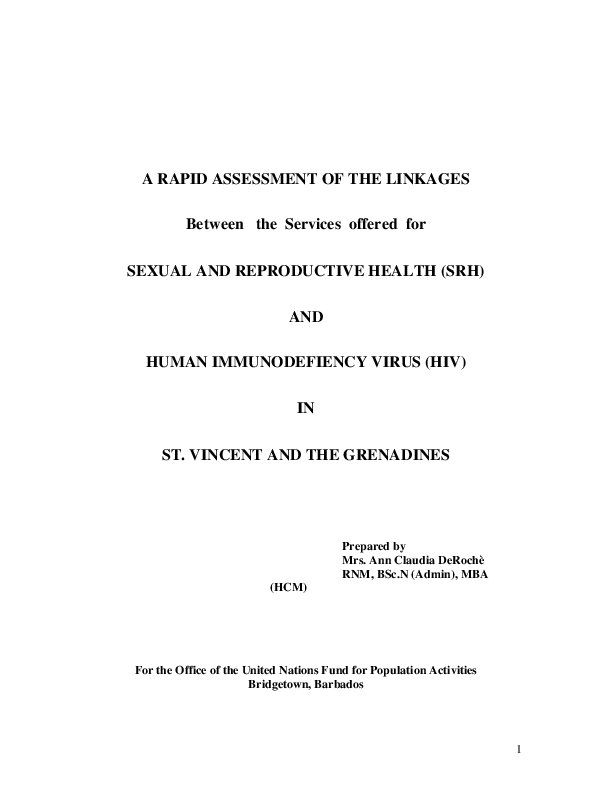
SRH HIV Linkages Assessment for St Vincent
St. Vincent and the Grenadines has made remarkable achievement in health care over the past twenty years. Since the declaration of Health for all by the year 2000, at Alma Ata in 1978 the health indicators have shown significant improvement. The natural growth rate of the population has fallen over this period from 2.8 to 2.4, the total fertility rate is 2.4 and the population grows at a rate of 0.13% per annum with a dependency ratio of 61%. Life expectancy at birth has been estimated at 72 years and infant mortality rate is 16.3 percent per 1000 live births [1] . [1] MOHE, Draft Health Sector Strategic Plan, Pg.3

SRHHIV Linkages Assessment Report St Kitts Nevis
The interactions between HIV/AIDS and SRH are acknowledged at varying levels. Their commonalities include similar root causes, transmission and management techniques. Therefore linkages between core HIV and SRH services have been shown not only to be economically feasible, but also associated with numerous public health benefits. Recommendations are therefore postulated for each health level: policy, systems and service provider levels.
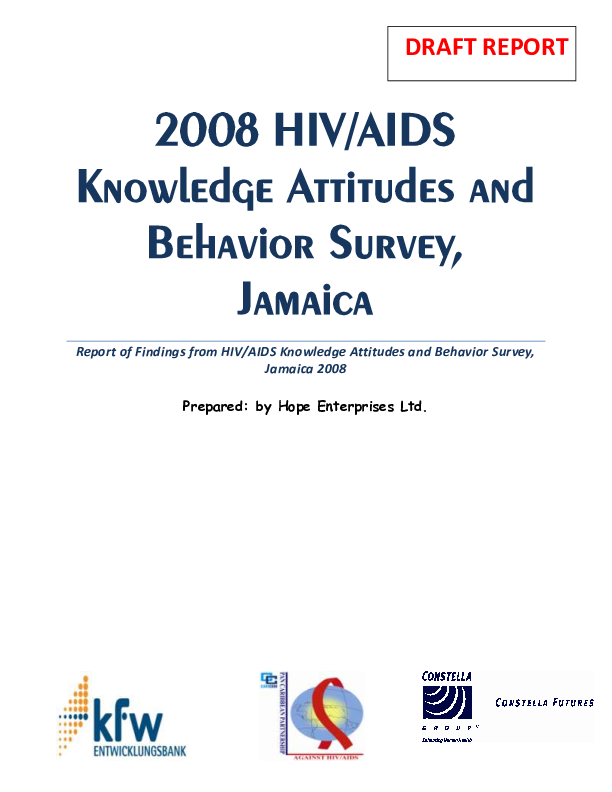
2008 HIV/AIDS Knowledge Attitudes and Behavior Survey, Jamaica
The Caribbean is second only to sub-Saharan Africa in HIV & AIDS prevalence. Jamaica, the largest island in the English speaking Caribbean island has however been relentless in its efforts to stem the spread of the disease and in 2007 estimated that approximately 1.3% of the adult Jamaican population was infected with two-thirds being unaware of their status. Behavioural surveillance is part of the Ministry of Health’s ongoing efforts. This report documents the results of the 2008 National Knowledge, Attitude, Behavior and Practices (KABP) survey conducted among adults 15-49 years in the general public. This survey is conducted every 3-4 years as part of the behavioural surveillance conducted for HIV/AIDS in Jamaica in which global and country specific behavioural indicators and intervention efforts are monitored. This 2008 survey was commissioned under the Caribbean Social Marketing Programme for HIV & AIDS Prevention (CARISMA) programme funded by PANCAP and its partner, the German Development Bank (KfW).
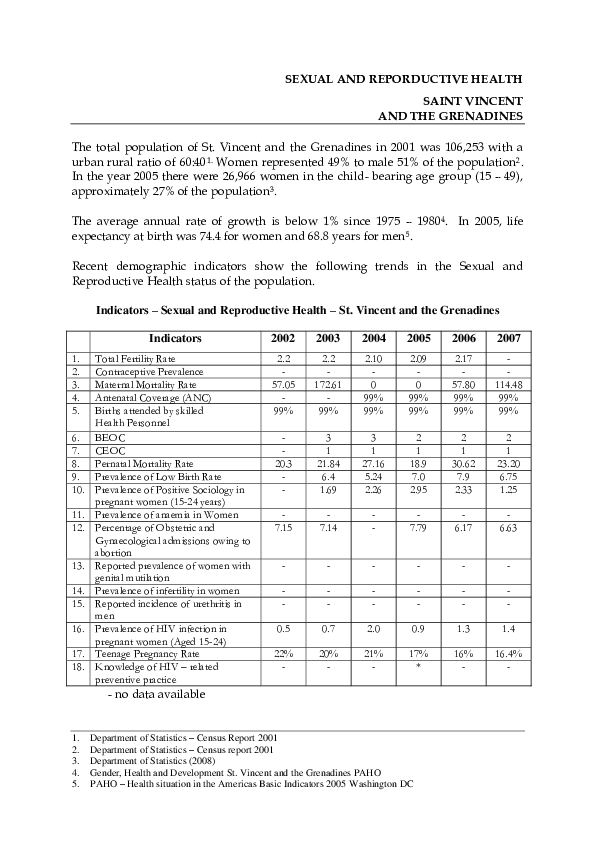
Assessment of the Availability of SRH Data St Vincent
The total population of St. Vincent and the Grenadines in 2001 was 106,253 with a urban rural ratio of 60:40. Women represented 49% to male 51% of the population. In the year 2005 there were 26,966 women in the child- bearing age group (15 – 49), approximately 27% of the population.
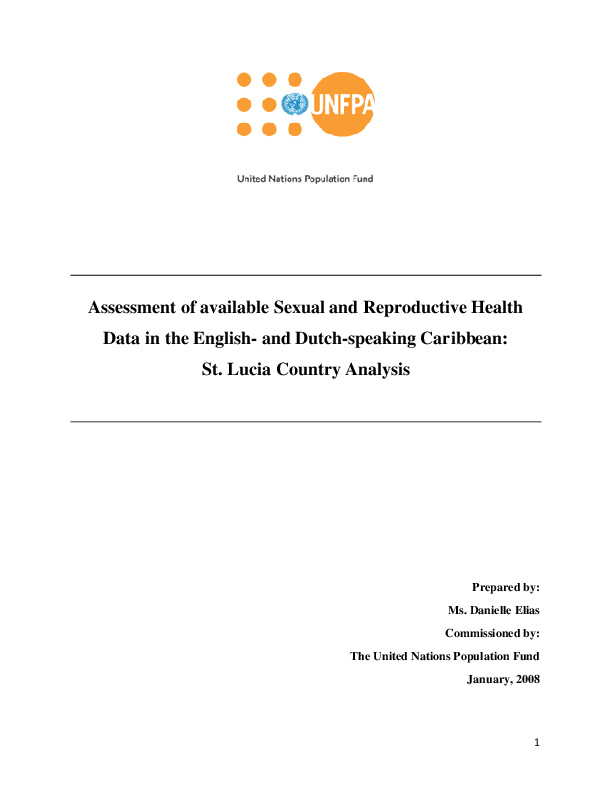
Assessment of available SRH Data in the Caribbean St Lucia
The meaning and definition of sexual and reproductive health has evolved throughout the years. Today it is defined as a state of complete physical, mental and social well-being and not merely the absence of disease or infirmity in all matters relating to the reproductive system and to its functions and processes. Reproductive health therefore implies that people are able to have a satisfying and safe sex life and that they have the capability to reproduce and the freedom to decide if, when and how often to do so.